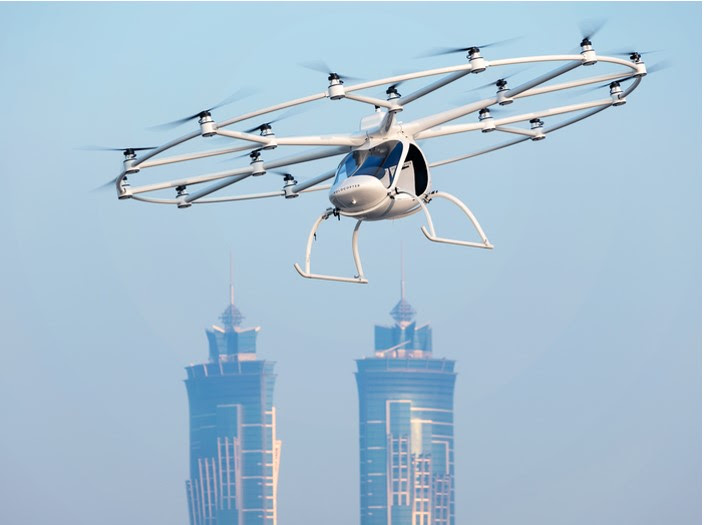
Drones, eVTOLs, and more… Can the FAA keep up?
by Jeff Brown, editor, The Bleeding Edge
How we’ll manage our busy skies…
I used to fly Cessna 172s when I was getting my private pilot’s license. That was back when I was earning my degree in aeronautical and astronautical engineering at Purdue University. It’s been a long time since I’ve flown my own plane, yet I’d love to start up again if I can ever find the time.
Our airspace is certainly getting busier. There are drones, electric vertical takeoff, and landing (eVTOL) craft planned as air taxis, “flying cars” (literally – although I don’t think they’ll be successful, eVTOLs are the way), and other innovative aircraft under development.
We’ve been analyzing these developments for some time now. They fall under a broad category that I like to think of as The Future of Transportation. Last year, we wrote about Volocopter, an air taxi startup that announced its plans to go public.
Volocopter Aircraft

Source: Volocopter
And Volocopter is in good company. Joby Aviation is working on another aircraft intended for the air taxi space. Earlier this year, the company partnered with All Nippon Airways (ANA), the largest airline in Japan, to launch its ride-hailing service by 2025.
Joby Aviation Aircraft

Source: Joby Aviation
And Google’s drone delivery division, Wing, is now the latest company to start making deliveries in the U.S.
Wing’s Drone

Source: Wing
All these examples are merely the tip of the iceberg… Ultimately, the future of transportation will be one of the biggest stories of this decade. We’re going to see an explosion of products and services coming out. Yet one of the biggest challenges we’ll face with this increase in air traffic will be regulatory. We’re going to have to figure out how to manage traffic in a world where air taxis and other flying vehicles are everywhere.
And we’ve seen some progress
At the start of 2020, the FAA began requiring all airplanes and helicopters to broadcast their positions using Automatic Dependent Surveillance-Broadcast (ADS-B) equipment. We can think of it as a beacon that projects the aircraft’s location.
The FAA said it anticipated this change would enable aircraft to fly more direct routes, saving time and fuel. And controllers would be able to reduce the minimum separation distance between aircraft, increasing capacity in the nation’s airways.
This change also makes it easier for a drone operator to steer clear of any nearby aircraft. We’ll need to install these ADS-B receivers onto drones so they can autonomously identify nearby aircraft.
Enabling automatic detection is what I like to think of as building the infrastructure. Artificial intelligence (AI) for an autonomous flight will enable these new aircraft to fly safely from point to point without incident.
And there are good signs of progress on the regulatory front:
-
The FAA has already been supportive of enabling autonomous drone deliveries. It will likely also accommodate regulations that will enable autonomous air taxis.
-
While early flights are already beginning, it will still be a few years before we see well-established air taxi networks with high volumes of passengers. In other words, there is time.
All of the companies are working through the process, using the existing system for now, and planning for the future of air travel.
-
Once the general framework is in place from the FAA for use of airspace, autonomous flying technology – coupled with autonomous detection technology – will ensure safe flights and avoid crashes even with busy skies.
And this will be accomplished without being a burden on existing air traffic control (ATC). Naturally, drone delivery routes won’t be permitted to fly through any airport or landing zones for things like eVTOLs.
This is a huge undertaking, building the future of transportation. While there is a tremendous amount of work being done, this particular theme will be exciting over the next couple of years.
New Opportunities Are Emerging For Citizens of The World.
Freedom and democracy may appear to be struggling to stay alive in America, but there may be a knock-out punch ready to be released. The evolution of the blockchain-enabled metaverse is going to enable the 'Citizens of the World' to gain their own Freedom by democratizing power and creating a new world with new rules, new players, and new opportunities. For 99.99% of us, the metaverse will improve our real-world lives through the democratization of power and opportunity.
Along with the major long-term trend of society towards decentralization and smaller-scale organizations, there are new opportunities developing to help 'Preparers' in the cryptocurrency sector. Businesses are beginning to issue their own Crypto Coins that can be traded on Cryptocoin Exchanges.
Markethive.com for example will be releasing its HiveCoin (HIV) in the coming weeks. It has tremendous upside potential that is outlined in a Video by Founder Tom Prendergast, "Entrepreneur Advantage…".
Not only that, if you go to their website and register as a FREE Member, you will be given 500 HiveCoins for "FREE" along with access to several Earning Opportunities and online tools to increase your HiveCoin balance.
Be sure to check it out today – Markethive.com
Tim Moseley











 The Fed's 'Ponzi Scheme' is crushing the middle class, this may be the only way out – Natalie Brunell
The Fed's 'Ponzi Scheme' is crushing the middle class, this may be the only way out – Natalie Brunell.gif)
.gif)


.gif)
.gif)


 Ukrainians waiting on border
Ukrainians waiting on border
 IMF's warning: Russia's war in Ukraine severely hurts global growth, adds to decade-high inflation
IMF's warning: Russia's war in Ukraine severely hurts global growth, adds to decade-high inflation.gif)
.gif) May silver futures bulls have the firm overall near-term technical advantage and have momentum. Silver bulls' next upside price objective is closing prices above solid technical resistance at the March high of $27.495 an ounce. The next downside price objective for the bears is closing prices below solid support at $24.045. First resistance is seen at $26.00 and then at today’s high of $26.195. Next support is seen at today’s low of $25.21 and then at $25.00. Wyckoff's Market Rating: 7.0.
May silver futures bulls have the firm overall near-term technical advantage and have momentum. Silver bulls' next upside price objective is closing prices above solid technical resistance at the March high of $27.495 an ounce. The next downside price objective for the bears is closing prices below solid support at $24.045. First resistance is seen at $26.00 and then at today’s high of $26.195. Next support is seen at today’s low of $25.21 and then at $25.00. Wyckoff's Market Rating: 7.0.






